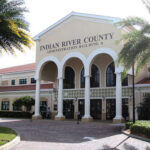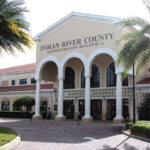VERO BEACH – While the Vero Beach City Council revisits whether it will revive the Dodgertown Golf Course, Craig Callan says further delay on a deal that would let Minor League Baseball build little league and softball fields on the property could put his adjacent sports village operation “in a very bad place.”
The newly seated City Council voted at its Nov. 16 meeting to hear more from local resident M.J. Wicker, who had made a pitch at an April gathering of the previous Council to restore the 37 acres under consideration into a community nine-hole golf course. The city and county attorneys have been in negotiations since September for a land swap that would give the county city-owned property to the south of Holman Stadium and give the city land owned by the county to create a more rectangular parcel along 43rd Avenue and 26th Street.
Those talks have been held up as the two sides worked out parking rights, but indications were the city and county would end up with a deal that would allow county tenant Minor League Baseball to build a cloverleaf of little league and softball fields on the Vero Beach Sports Village complex near Holman Stadium.
Minor League Baseball hopes to begin to market the softball and little league fields to travel teams who hold tournaments on a weekly basis throughout the spring and summer.
The current council is currently keeping the land swap negotiations moving forward, while at the same has agreed to hear again from Wicker and his suggestion of restoring the now fallow land into a community golf course at its Dec. 7 meeting.
“Right now we are stalled and if there are any more delays it puts us in this gray area” says Callan, “and while we wait, the less opportunity there is for us to be ready for next season, which basically puts us in a very bad place.”
Callan also said the Vero Beach Sports Village venture will fail if the cloverleaf of fields are not part of their operation.
Wicker was not in attendance at the last City Council meeting when his proposal was revisited and is surprised by it all.
He said without more of a commitment from the city, he is not sure he can come up with the investors to put in the estimated $1 to $1.5 million it will take to fix the irrigation system and level and re-seed the grounds.
“I am not involved with anybody who has a wheelbarrow of money and is ready to move in there and do whatever needs to be done to open up that course,” he said. “I think that the city should come out and say we want to keep the course open and these are the parameters that we are going to require as far as having somebody re-open the course.”
One of the key questions anyone thinking about opening up a nine-hole walking golf course needs to answer is would the community support such a venture?
Commissioner Peter O’Bryan points to the now empty Vista Royale and Vista Gardens courses on U.S. 1 that have been unable to stay in business as evidence it might not.
“The overall feeling right now is that golf courses are struggling around the whole state and we saw that at Vista Royale and Vista Gardens,” he said. “If someone wants to come into a course that is abandoned and put in a million to get it into playing shape and try to shape the fees to run that at a profit, I think is a tall order.”
Wicker has said he envisions Dodgertown Golf course returning to the days when his family worked there and he played there and it was an economical way to spend an afternoon outdoors.
Bela Nagy, head professional at County-owned Sandridge Golf Course, said keeping a round of golf affordable would make it impossible for investors to recoup their investment.
“If you want to keep costs low, you are not going to make any money at it,” said Nagy, who noted that over the last eight years the National Golf Foundation has charted a 2 percent yearly decline in golf player participation.
The two Council members most vocal about considering restoration of the Dodgertown golf course are Brian Heady and Craig Fletcher.
Heady has been consistently opposed to the land swap or the use of tax dollars the county has agreed it will pay as part of lease improvements it negotiated in the initial agreement with Minor League Baseball.
“If I am given a choice of doing a couple of things, one of which involves spending tax money and one of them involves getting private investors, I am almost always going to go with the private investors,” he said.
Fletcher made it clear he is in no mood to do any favors for Minor League Baseball officials, many of whom he views as part and parcel of the Dodger group that abandoned Vero Beach.
“I don’t know if the community can support it or not. What we would do is lease it to a private enterprise and they would make the arrangements,” Fletcher said. “We can’t lose with it as a golf course. The private enterprise makes money or doesn’t make money. We can’t lose. On the other hand, we are giving property away that is a natural resource and should be used to raise taxes and giving it to a private enterprise that has a bad track record of not having fulfilled their obligations.”
“I don’t see it (the golf course) as bringing a lot of new dollars into the community,” Commissioner O’Bryan said. “With the baseball fields you have families coming in from around the state and the region. When you have little league baseball, softball, lacrosse, volleyball, soccer, they travel all over doing tournaments. It is almost a year-round deal with all these different sports. Mom and dad travel with the team and they fill the hotels, they go to restaurants they are there for two or three nights.”
Opponents of the little league fields also point to a cloverleaf of baseball diamonds about two miles away from the Dodgertown facility at Michael Fields at the intersection of 26th Street and US 1.
They say Minor League Baseball could use those fields and the county would not have to pay to build on the Dodgertown property.
Callan says that is not a feasible option.
“Absolutely not,” he said. “First of all you don’t go to a baseball facility that is selling sleeping rooms, locker rooms, videos, swimming pools and all the amenities within walking distance, and then say ‘Oh, by the way, you’ve got to drive two miles to go play on fields that are no way up to par.'”
Callan also said the County commissioners and Minor League Baseball agreed when the lease was negotiated the county would pay to light four more baseball fields at the facility.
Instead, they now are asking to light two fields and use the remaining money to build the cloverleaf.
Callan has estimated lighting the four fields would cost between $800,000 and $900,000.
While the City Council would need just a third vote in addition to Heady and Fletcher to scuttle the land swap plans and go forward with trying to refurbish the golf course, Fletcher left open one possibility that might sway his stance.
“My biggest problem is that these proposed fields are not for the public but for a private corporation,” he said. “If you can tell me the little league guys can play on there for free, then I’d have to think about it. Everything is negotiable, but right now I don’t see why I should help a private corporation.”
Callan, who has a long history with Fletcher dating back to the Dodger spring training negotiations, said he has no problem in theory with providing access to local little leaguers and softball players.
“In all the years I have been here since 1978, I don’t remember one time that either the Dodgers or Minor League Baseball has not bent over backward to cooperate with the community,” he said.






